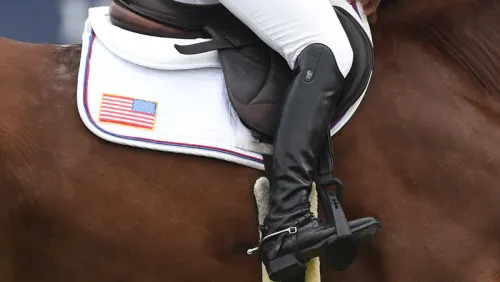State officials reported on Dec. 21 that a fourth horse has died in the EHV-1 outbreak. The horse, stabled at the Palm Beach Equine Sports Complex, “went downhill very quickly,” and died, according to Florida Department of Agriculture spokesperson Liz Compton.
He developed a fever on Dec. 16, and on Dec. 21, became acutely neurologic and died.
The Palm Beach Equine Sports Complex is a 45-acre property with 312 stalls, located adjacent to the Palm Beach Equine Clinic and one mile from the Winter Equestrian Festival showgrounds. One of the original EHV-1 fatalities, a horse from Maryland who had shipped to Florida on the same van as the index case, was stabled at the Complex as well, so the facility has been under quarantine since the beginning of the outbreak.
Currently, there are eight cases of EHV-1 confirmed by laboratory testing, seven in the Wellington, Fla., area, and one in Ocala, Fla. The horse in Ocala had spent time at the Palm Beach Equine Clinic in Wellington and had been in contact with the original EHV-1 case. (See prior news). Another horse, stabled in Jupiter, Fla., has exhibited neurological signs of the disease but remains stable. There are also eight suspected cases, pending laboratory reports.
There are now eight facilities under state-mandated quarantine, six in Wellington, one in Ocala, and one in Jupiter. At the moment, there are no state or federal restrictions on equine travel into, out of, or within the state of Florida.
USDA officials have traced all the horses involved in the original shipment from Europe (see prior news) and state veterinarians from Rhode Island, Massachusetts, Pennsylvania, Kentucky, New Hampshire, Tennessee, North Carolina and South Carolina have confirmed that there are no reported cases of EHV-1.
ADVERTISEMENT
Compton was reluctant to comment on the degree of the containment of the disease. “It’s a very subjective thing,” she said. “What I can tell you is that every positive or suspect case with lab tests pending have had some contact with the facility involved with the initial horse [the Palm Beach Equine Clinic]. It’s not like the virus itself has spread rampantly through the state. There’s a link between every suspect case or positive case to the original index case. And since the incubation period can last as a long as 21 days, and the index case arrived on Nov. 29, it’s very possible that we’re on the down side of this outbreak.
“To date, we have eight cases confirmed and eight more suspect cases. Given the sheer number of horses in the immediate area and the state, that’s a good sign. It’s certainly not a good thing to those who have infected horses, but it’s a positive sign as a whole.”
Calder Race Course remains voluntarily closed, since the horse now in Ocala had shipped there from the Palm Beach Equine Clinic and had spent five days at the track before shipping to Ocala. Tampa Bay Downs racetrack is not accepting new horses onto their grounds.
Trainer Joe Norick, Wellington, Fla., whose pony was the index case but has since recovered, could have his state-mandated quarantine lifted by Jan. 1 if horses at his facility have no further symptoms.
“I see a huge change down here, and things are looking much better,” he said. “On an overall basis, it’s well under control. Things are getting better, and people are being great.”
According to the Florida Association of Equine Practitioners, the outbreak appears to be contained to facilities already under quarantine. They recommend that shipping horses into Wellington should be safe after Christmas, and provided that no new cases emerge, they anticipate that the show season should be underway as scheduled in the new year.














